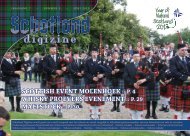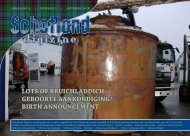GELUKKIG NIEUW JAAR! HAPPY NEW YEAR! - Schotland Digizine
GELUKKIG NIEUW JAAR! HAPPY NEW YEAR! - Schotland Digizine
GELUKKIG NIEUW JAAR! HAPPY NEW YEAR! - Schotland Digizine
Create successful ePaper yourself
Turn your PDF publications into a flip-book with our unique Google optimized e-Paper software.
TARTAN & WHISKY<br />
Nowadays<br />
the Scots<br />
do not need to<br />
play bagpipes<br />
to frighten<br />
their enemies<br />
They do it<br />
to annoy<br />
their<br />
neighbours<br />
...<br />
15 • <strong>JAAR</strong>GANG 4 • NUMMER 3 • JANUARI 2010<br />
JAMES WATT (1736 - 1819)<br />
Watt was a Scottish inventor and mechanical engineer, renowned for his<br />
improvements in steam engine technology.<br />
James Watt was born in Greenock on 18 January 1736. His father was a prosperous<br />
shipwright. Watt initially worked as a maker of mathematical instruments, but<br />
soon became interested in steam engines.<br />
Th e fi rst working steam engine had been patented in 1698 and by the time of<br />
Watt’s birth, Newcomen engines were pumping water from mines all over the<br />
country. In around 1764, Watt was given a model Newcomen engine to repair. He<br />
realised that it was hopelessly ineffi cient and began to work to improve the design.<br />
He designed a separate condensing chamber for the steam engine that prevented<br />
enormous losses of steam. His fi rst patent in 1769 covered this device and other<br />
improvements on Newcomen’s engine.<br />
Watt’s partner and backer was the inventor John Roebuck. In 1775, Roebuck’s<br />
interest was taken over by Matthew Boulton who owned an engineering works in<br />
Birmingham. Together he and Watt began to manufacture steam engines. Boulton<br />
& Watt became the most important engineering fi rm in the country, meeting<br />
considerable demand. Initially this came from Cornish mine owners, but extended<br />
to paper, fl our, cotton and iron mills, as well as distilleries, canals and waterworks.<br />
In 1785, Watt and Boulton were elected fellows of the Royal Society.<br />
By 1790, Watt was a wealthy man and in 1800 he retired and devoted himself<br />
entirely to research work. He patented several other important inventions<br />
including the rotary engine, the double-action engine and the steam indicator,<br />
which records the steam pressure inside the engine.<br />
Watt died on 19 August 1819. A unit of measurement of electrical and mechanical<br />
power - the watt - is named in his honour.
















